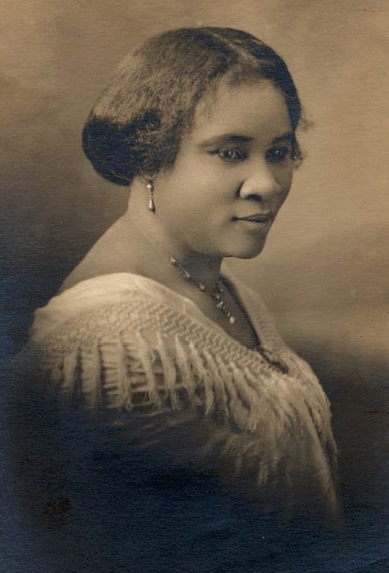C. J. Walker

Credit: Scurlock Studio (Washington, D.C.) (photographers)
Licence: Scurlock Studio (Washington, D.C.) (photographers)., Public domain, via Wikimedia Commons
| Giver: | Individual |
|---|---|
| Receiver: | - |
| Gift: | Items |
| Approach: | Philanthropy |
| Issues: | 10. Reduced Inequalities, 12. Responsible Consumption and Production |
| Included in: | Social Activism |
Madam C.J. Walker (1867-1919) was a pioneering African-American entrepreneur, activist and philanthropist. Inventor of Madam Walker’s Wonderful Hair Grower, she began by marketing her products door-to-door, eventually building an extensive empire of factories, salons and beauty schools. Walker also played an important role in helping other African-American women achieve economic self-sufficiency, providing educational and training opportunities, establishing professional associations and investing in small businesses. In her later years Walker earned renown as a philanthropist and activist, giving generously to social justice causes while serving as a spokeswoman for civil rights issues.
Walker was born Sarah Breedlove in Delta, Louisiana, the daughter of former slaves. Following the death of her first husband, Breedlove moved with her daughter to St. Louis, where her brothers worked as barbers. For the next several years she supported herself working menial jobs, and at one point briefly remarried. In St. Louis she also became active in the St. Paul African Methodist Episcopal Church, where she formed friendships with prominent members of the city’s African-American community.
The onset of a chronic scalp condition changed the course of Breedlove’s career. In her search for a remedy she discovered the haircare products of African-American entrepreneur Annie Turnbo. A short time later, Breedlove moved to Denver to join Turnbo’s company as a sales representative. She married Charles Joseph Walker, an advertising salesman, and changed her name to Madam C.J. Walker.
Shortly after her marriage she launched her own company. She developed a new scalp treatment product, Madam Walker’s Wonderful Hair Grower, and began selling it door-to-door in Black neighborhoods across the South. As her business grew she recruited African-American women and men to join her sales force, quickly earning a reputation for paying good wages and setting fair wholesale prices for her products.
In 1910 Walker relocated to Indianapolis, where she opened a new production facility, the Madam C. J. Walker Manufacturing Company. During these years she became active in philanthropy, garnering national news coverage when she donated USD 1,000 to a local YMCA. In 1913 she established a new business in Harlem, Walker Salon, entrusting it to her daughter while she focused on expanding her sales efforts into the Caribbean and Central America.
Walker settled in New York in 1916. She assumed a leading role in civil rights advocacy, donating USD 5,000 to the NAACP and joining a delegation to the White House to push for anti-lynching legislation. At a convention of the Madam C.J. Walker Hair Culturists Union of America in 1917, she encouraged others working in her field to devote themselves to social justice. At the time of her death two years later, her work force had grown to roughly 20,000 sales representatives.
Walker’s combination of generosity and activism challenged the dominant paradigm of the era. At a time when philanthropy was almost exclusively associated with wealthy white men, Walker’s charitable activities upended traditional notions of giving. Perhaps more significantly, her work blazed a trail for other African Americans to assume leadership roles in the philanthropic field.
Contributors: Maha Tazi, Stephen Meyer
| Source type | Full citation | Link (DOI or URL) |
|---|---|---|
| Book |
Marsico, Katie. “Madame CJ Walker,” Life Skills Biographies, Cherry Lake Publishing, 2008 |
ISBN-13; 978-1-60279-074-2. ISBN-10: 1-60279-074-2 |
| Book |
Rooks , Noliwe Makada.”Hair-raising: African American Women, Beauty Culture, and Madame C.J. Walker,” The University of Iowa ProQuest Dissertations Publishing, UMI, 1994. |
http://bit.ly/3K38bck |
| Publication |
Kamrul Hasan, Md.; Hayek, Mario Joseph; Williams Jr, Wallace A; Pane-Haden, Stephanie; Gelvez, Maria Paula Martinez. “Activist Identity Construction of Madame C.J. Walker,” Journal of Management History, Vol. 26 No.3. 2020. |
http://bit.ly/400sY5H |
| Book |
Lommel, Cookie. “Madam C.J. Walker: Entrepreneur,” Holloway House Publishing Company, 1993. |
ISBN-10: 0870675974, ISBN-13: 978-0870675973. |
| Book |
R.Stille, Darlene. “Madam C.J. Walker: Entrepreneur and Millionaire,” Compass Point Books, 2007. |
ISBN-13: 978-0-7565-1883-7, ISBN-10: 0-7565-2203-X |